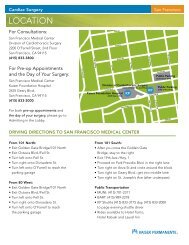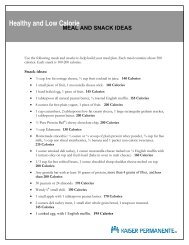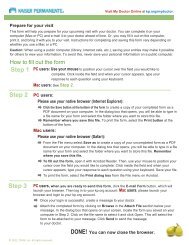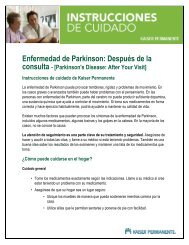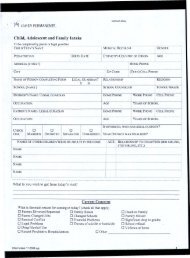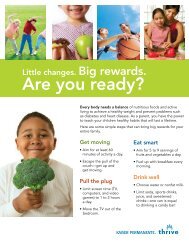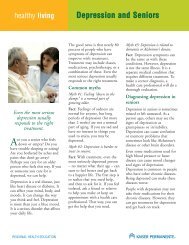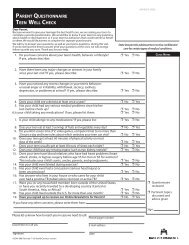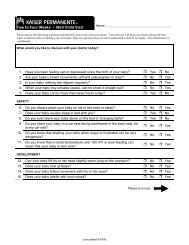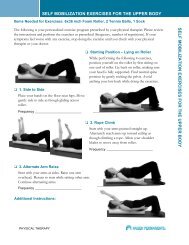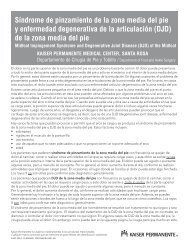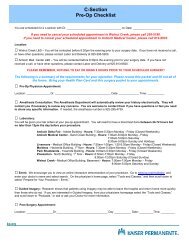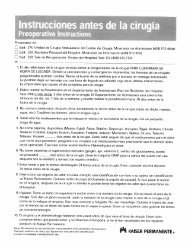Relaxation Skills - My Doctor Online - Kaiser Permanente
Relaxation Skills - My Doctor Online - Kaiser Permanente
Relaxation Skills - My Doctor Online - Kaiser Permanente
Create successful ePaper yourself
Turn your PDF publications into a flip-book with our unique Google optimized e-Paper software.
healthy living<br />
<strong>Relaxation</strong> <strong>Skills</strong><br />
How to do progressive muscle relaxation<br />
Pick a place where you can stretch<br />
out comfortably, such as on a pad<br />
or carpeted floor. Tense each muscle<br />
group for 4 to10 seconds (hard,<br />
but not to the point of cramping).<br />
Then release the muscle and give<br />
yourself 10 to 20 seconds to relax.<br />
Try to relax each muscle group a<br />
little more deeply each time you do<br />
this exercise.<br />
How to tense muscle groups<br />
• Hands: Make a fist.<br />
• Wrists and forearms: Extend your<br />
arms and bend hands back at the<br />
wrist.<br />
• Biceps and upper arms: Make a<br />
fist, bend arms at elbows, and flex<br />
biceps.<br />
• Shoulders: Shrug them.<br />
• Forehead: Wrinkle it into a deep<br />
frown.<br />
• Around the eyes and bridge of<br />
the nose: Close eyes as tightly as<br />
possible. (Remove contact lenses<br />
before beginning this exercise.)<br />
• Cheeks and jaws: Grin from ear<br />
to ear.<br />
• Around the mouth: Press lips<br />
together tightly.<br />
• Back of the neck: Press head back<br />
against the pad or supporting surface.<br />
• Front of the neck: Touch your<br />
chin to your chest.<br />
• Chest: Take a deep breath, hold<br />
it, then exhale.<br />
• Back: Arch your back up and<br />
away from support surface.<br />
• Stomach: Suck your stomach into<br />
a tight knot.<br />
• Hips and buttocks: Press your<br />
buttock cheeks together tightly.<br />
• Thighs: Clench hard.<br />
• Lower legs: Point your toes<br />
toward your face, as if trying to<br />
bring them up to touch your head.<br />
• Lower legs: Point your toes away<br />
and curl them downward at the<br />
same time.<br />
<strong>Relaxation</strong> response<br />
The relaxation response slows the<br />
heart rate and breathing, lowers<br />
blood pressure, and helps relieve<br />
muscle tension. It can help you<br />
slow down, reduce stressful feelings,<br />
and refocus your thoughts.<br />
Technique (adapted from Herbert<br />
Benson, MD):<br />
• Sit quietly in a comfortable position<br />
with your eyes closed.<br />
• Become aware of your breathing.<br />
Breathe slowly and steadily;<br />
breathing from your belly and<br />
not from your chest.<br />
• Each time you exhale, say the<br />
word “one” (or any other word<br />
or phrase) silently or aloud.<br />
Or, you may choose to fix your<br />
gaze on a stationary object. Any<br />
mental stimulus will help shift<br />
your mind away from distracting<br />
thoughts.<br />
• Continue this for 10 to 20 minutes.<br />
As distracting thoughts enter<br />
your mind, don’t dwell on them.<br />
Just allow them to drift away.<br />
• Sit quietly for several minutes<br />
until you are ready to open your eyes.<br />
• Notice the difference in your<br />
breathing and your pulse rate.<br />
Don’t worry about becoming deeply<br />
relaxed. The key to this exercise<br />
is to be passive, to let<br />
distracting thoughts slip away like<br />
waves on the beach. Practice for<br />
10 to 20 minutes once or twice a<br />
day, but wait for at least two hours<br />
after a meal. When you have set up<br />
a routine, the relaxation response<br />
should come with little effort.<br />
Additional resources<br />
• Connect to our Web site at kp.org.<br />
• Visit your facility’s Health<br />
Education Department for books,<br />
videos, classes, and additional<br />
resources.<br />
• Want a customized online stress<br />
management plan? Check out<br />
our HealthMedia® Relax<br />
Healthy Lifestyles program at<br />
kp.org/healthylifestyles.<br />
• Try out our Health Coach Stress<br />
Less Program at kp.org/mindbody.<br />
• If you are hit, hurt or threatened<br />
by a partner or spouse, this can<br />
seriously affect your health, including<br />
your ability to manage stress.<br />
There is help. Call the National<br />
Domestic Violence Hotline at<br />
1-800-799-7233 or connect to<br />
ndvh.org.<br />
This information is not intended to diagnose or to take the place of medical advice or care you receive from your physician or other health care<br />
professional. If you have persistent health problems, or if you have additional questions, please consult with your doctor. If you have questions or<br />
need more information about your medication, please speak to your pharmacist. <strong>Kaiser</strong> <strong>Permanente</strong> does not endorse the medications or products<br />
mentioned. Any trade names listed are for easy identification only.<br />
© 2007, The <strong>Permanente</strong> Medical Group, Inc. All rights reserved. Regional Health Education.<br />
90330 (Revised 2-10) RL 6.4



